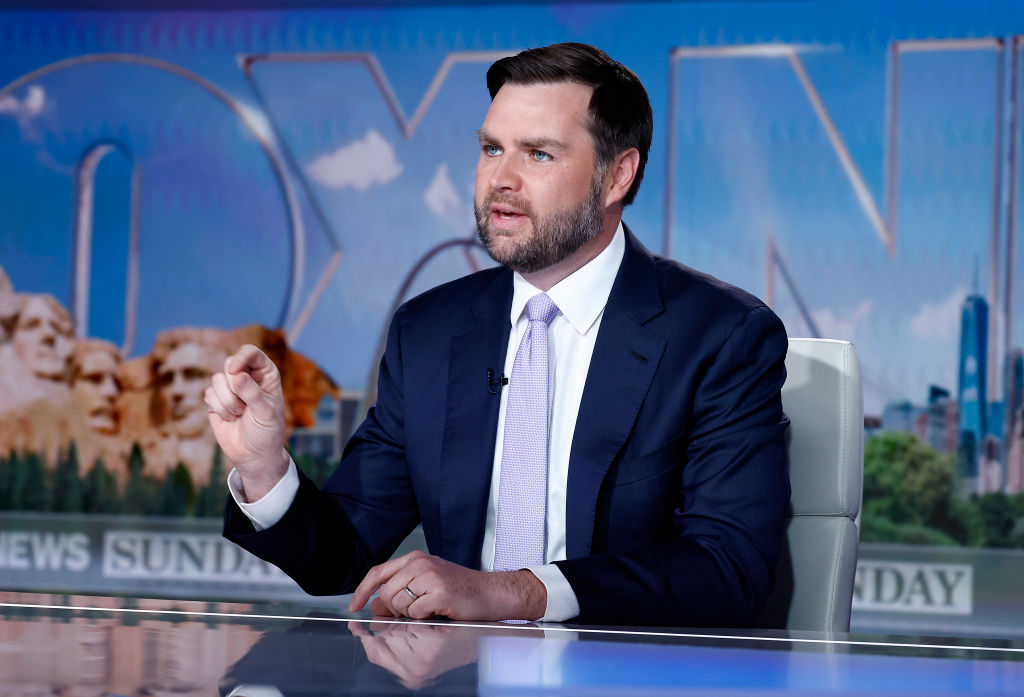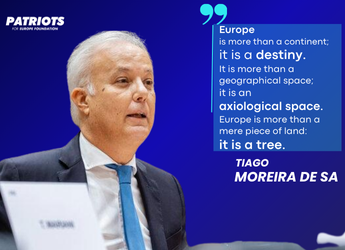Tiago Moreira de Sá, MEP (Chega/Patriots for Europe) analyses the American Vice President, J.D. Vance’s speech at the Munich Security Conference about the decline of Europe and compares Europe as a tree with strong roots : the foundational values of Christianity, Conservatism, Liberalism, and Populism. He explains how to survive and thrive, Europe must reclaim its heritage, reaffirm its principles, and resist the forces of relativism and nihilism that threaten to sever it from its roots — for civilizations, like trees, can only endure if they remain true to their essence.
“This above all”, Polonius exhorted his son Laertes, “to thine own self be true, / And it must follow, as the night the day, / Thou canst not then be false to any man.” This famous imperative, immortalized by Shakespeare in Hamlet, is not merely a fatherly advice. In fact, it is an ontological principle: loyalty to oneself is the very the condition for the presence of truth in the world. The individual who is true to himself does not close himself off but opens up; he does not retreat into an impenetrable burrow but inscribes himself within a continuity of heritage and destiny.
Europe, which for centuries was the guardian of this principle, seems increasingly proud of the infidelity it now shows toward itself, its ancestors, its history, and the values it once inspired in the hopes of its people, in the minds of its artists, in the visions of its rulers. This self-betrayal is, in fact, the betrayal of its vital principle, from which follows, implacable and fatal, the age of inauthenticity that always precedes every period of decline.
Trapped in this morbid cult of infidelity, and in the almost Pavlovian urge to repudiate anything that emanates from the Trump administration, the European elites have spectacularly failed to grasp the profound meaning of J.D. Vance’s speech at the Munich Security Conference.
The American Vice President did not deliver a condescending sermon, nor did he impose an imperialist sentence upon us. Like Polonius to Laertes, he exhorted us to be true to ourselves, placing us before a mirror that reflects both the greatness of our past and the shadow of our decline. Our tragedy lies in being governed by mediocre elites who, when faced with this mirror, recognize neither.
For the danger threatening Europe does not, in fact, come from outside but grows within. It is a weariness, a shame, a remorse, a self-hatred, and a rejection of the very forces that made it great for so many centuries. Once a beacon of civilization, dominating politics and economics, engineering and military science, arts and letters, Europe, led by relativist and nihilist elites, has succumbed to the dangerous twilight temptations that always haunt and darken civilizations.
Vance reminded us of the foundational values shared by Europe and America; values that make the Atlantic Alliance more than a mere alliance of interests – in fact, an alliance of values, a moral pact, the extension of a shared civilization. Values in the name of which we shed blood side by side in the swamps of the Marne, in the forests of the Ardennes, on the beaches of Normandy.
And these values are now under threat – not from external enemies, but from the internal erosion of a Europe that no longer knows who it is or what it stands for. And he who does not know what he stands for cannot know what he must stand against.

Photo by Paul Morigi/GettyImages
What, then, is Europe?
And what is this new right that proclaims, “Make Europe Great Again”? Understanding one helps us understand the other. To understand both, we must first clarify an essential point: what we call Europe is more than a continent; it is a destiny. It is more than a geographical space; it is an axiological space. Europe is more than a mere piece of land: it is a tree. Europe is a distinct living identity, comparable to a tree, from whose trunk – Christianity – three great branches emerge: Conservatism, Liberalism and Populism.
The trunk: Christianity.
The backbone of European civilization, Christianity is simultaneously a religious, moral, and philosophical matrix, shaping and defining the political, legal and cultural institutions that sustain European social order. The concept of human dignity, the principle of natural and inalienable equality, the notion of a transcendent order, the idea of moral judgment – and of a moral judge, God – that limits the excesses of power and places the victim at the very heart of ethics: all of this stems from the biblical tradition. Christianity provided Europe with a spiritual skeleton capable of withstanding the tremors of time and the abuses of tyranny. It was the Bible that taught us the revolutionary value of Liberty, and it was through it that we learned to say to tyrants of all times and places: “Let my people go.” When this axial reference dissolves, its branches wither: Conservatism degenerates into dogmatism, trapped in a romanticized revisionism of the past; Liberalism into relativism, consumed by the alienating atomization of the individual; and Populism into irrationalism, devoured by the violent tribalization of identity.
The first branch: Conservatism.
The sentinel of continuity, it reminds us that we are always more than just ourselves. Thinkers like Edmund Burke and Roger Scruton taught us that the world does not begin with each generation; that it does not commence with our arrival; that we begin our existence as Camões begins Os Lusíadas: in medias res, “in the midst of action”, when the Men above the vulgar File have already passed beyond the Taprobana. That we are heirs before we are innovators, debtors before we are creditors, listeners before we are speakers. That we are, in the beautiful expression of Bernard of Chartres, “dwarfs standing on the shoulders of giants”. Conservatism defends institutions, culture, and traditions as repositories of collective wisdom accumulated over centuries, preserved and transmitted across generations. It rejects utopias and social experiments, distrusts social engineering, and recognizes that true progress is slow and rooted in historical experience, cognitive perseverance and moral prudence. Without Conservatism, Europe loses its memory – and with it, its identity.
The second branch: Liberalism.
Classical liberalism – not its modern version degenerated into delusional progressivism and failed social democracy – affirms the primacy of the person over the State, the individual over the collective, and liberty over coercion. John Locke provided its philosophical bedrock: freedom, limited government, property rights, the social contract, and the right to rebellion against tyranny. This original liberalism does not reject tradition but insists that the defense of order is only justified if it guarantees freedom, for order cannot serve as a refuge for tyranny. By exalting individual liberty and the intrinsic dignity of the human being, Liberalism embodies the conviction that power, inherently corruptible, must be restrained by rational and moral limits, by institutional “checks and balances”. In this tradition of thought, constitutions emerge not merely as mere compilations of norms but as celebrations of a sacred pact that subjects power to the law – a shield raised against power and arbitrariness, against tyranny and anarchy, against the washed hands of Pontius Pilate and against the democratic vote of the mob that chooses Barabbas.

The third branch: Populism.
The most turbulent and vigorous branch of the tree, it represents the democratic impulse against the oligarchic temptation, the uprising of the people against bureaucratic elites, the revolt of the will to recognition against the will to exclusion. More than a century ago, Robert Michels taught that every political organization, including democratic parties, tends to become an oligarchy: its “iron law”. Populism – from Jacksonianism to Trumpism in the U.S.; from the Levellers to the Patriots in Europe – is the cyclical revolt against this equally cyclical crystallization of power. Contrary to common discourse (which, unsurprisingly, often comes from the elites), populism is not a threat to democracy – it is, on the contrary, one of its modes of revitalization. It is natural for Populism to be a scream, as elitism is a deafness. In its fervent opposition to the elites, Populism is a House of Commons that prevents democracy from degenerating into a House of Lords.
While Conservatism focuses on the bond between generations and Liberalism on individual freedom, Populism sees the people as a living – and above all, sovereign – entity. The new right is the current heir of this tradition and can never be fully understood without reference to it. Christianity provides its roots and trunk, ensuring moral guidance and a sense of transcendence. It is conservative because it seeks to preserve and pass on the civilizational heritage. It is liberal because it upholds that governments exist to promote and protect individual freedom. And it is populist because it reminds the elites that sovereignty resides in the people.
The branches of tradition, liberty, and popular sovereignty express, respectively, the Wisdom of the Ancestor, the Dignity of the Individual, and the Sovereignty of the People. The crisis of one leads to the crisis of the others.
Europe’s current crisis – this weariness, this shame, this remorse, this self-consuming hatred – stems from infidelity to this organic structure, from the temptation to uproot itself or prune its branches in the name of a modernity without ancestors, without individuals, without peoples.
In 1945, at its post-apocalyptic refounding moment, Europe imposed upon itself a contradiction that is now devouring it from within: on one hand, peace; on the other, guilt; on one hand, democracy; on the other, decadence; on one hand, absolute tolerance; on the other, self-hatred. Identifying itself as abject and unworthy, Europe confuses itself with its own guilt. The European decline visible today in various domains (cultural, economic, military, political, moral) is, to a great extent, the corollary of this penitential self-conception, paralyzed between the assaults of its enemies and the shadows of its own ghosts.
J.D. Vance’s words were, after all, Shakespearean: “to thine own self be true”.
Be true to yourself. If Europe wishes to survive, it must rediscover this fidelity. Reaffirm its values. Revisit its vital principle. For to live is to inherit, but to inherit is also to transform. To care for our tree. Because history, from its oldest pages to its most recent, teaches us a cruel lesson: civilizations, like trees, can also be felled.
The tree of Europe is sick, but it is not dead. One can sense, in the fear of its elites and the hope of its peoples, that both are witnessing the same phenomenon: one of its branches is bearing fruit once again.

